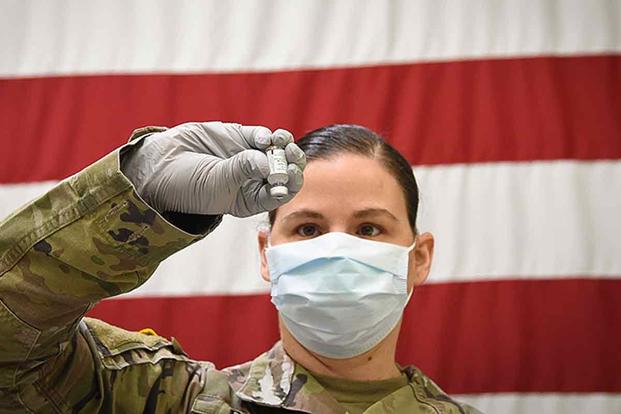Active-duty soldiers have three months to be fully vaccinated against COVID-19 or face a possible discharge from the force, the Army announced Tuesday.
The 485,900 soldiers on active duty must be vaccinated by Dec. 15. But the 336,500 National Guard and 189,800 Reserve troops have until June 30, 2022, to be fully inoculated.
As of Tuesday, about 80% of active-duty soldiers had received at least one vaccine dose, according to an Army spokesperson. However, the National Guard and Reserve don’t have accurate numbers for how much of their forces are vaccinated, given many of those troops receive vaccines outside of the military.
"This is quite literally a matter of life and death for our Soldiers, their families and the communities in which we live," Lt. Gen. R. Scott Dingle, the U.S. Army surgeon general, said in a statement. "Case counts and deaths continue to be concerning as the Delta variant spreads, which makes protecting the force through mandatory vaccination a health and readiness priority for the total Army."
Read Next: Marine Corporal Discharged over Refusal to Wear a Mask
The military's largest branch issued its mandate after the other services announced similar timelines. For now, only Pfizer-BioNTech's coronavirus vaccine has received full approval from the Food and Drug Administration and, as such, is the one officially mandated. But troops are allowed to seek out the other available vaccines if they prefer.
That means that if troops receive one of the two-shot varieties of the vaccine they will need to have had their second shot and passed the two-week post vaccine waiting period before the December deadline.
Along with other vaccines, the Defense Department has a long list of health-related mandates for troops. Service members being unvaccinated can cause many complications for commands, as they may become undeployable.
Soldiers who refuse vaccinations will be counseled by their chain of command. Such counseling typically involves starting a paper trail and having a discussion with the service member about the orders they are violating; it isn't always followed by a punishment.
But continued failure to comply with the order "could result in administrative or non-judicial punishment -- to include relief of duties or discharge," according to a statement from the Army.
Commanders will request a General Officer Memorandum of Reprimand, which are largely seen as career killers, to be initiated for any soldier who refuses inoculation without an exemption.
A discharge can cost a soldier their benefits, including the GI Bill.
Military.com recently reported on a Marine corporal who refused to comply with an order that mandated unvaccinated troops wear a mask indoors. She was kicked out of the force within a week of violating the order and given a general discharge under honorable conditions.
Those seeking waivers to avoid immunization essentially have two options: medical or religious exemptions, according to Sean Timmons, an attorney with the Houston-based law firm Tully Rinckey.
The military is a relatively young, healthy community whose members already have received numerous vaccines, so most people are "not going to have the ability to be granted a medical waiver," Timmons said.
A religious exemption may be more likely, he said, if the person can demonstrate that their religious practice compels them to be morally opposed to vaccination. However, no major religion has come out against the COVID-19 vaccine or vaccines in general.
Joe Seiner, a professor at the University of South Carolina School of Law, said soldiers will need to demonstrate that the vaccine conflicts with a sincere religious belief or have received prior waivers.
"You'd probably want to show them that you haven't gotten certain vaccinations or, if you are new to the service, that this would be consistent with your prior history," Seiner said during an interview.
Still, if a religious exemption request is denied by the military, the rejection may provide a basis for a lawsuit, Timmons said.
"It's possible for attorneys to work with an admission to say there's a good faith objection," he explained.
Timmons said his firm has been approached by service members expressing interest in filing lawsuits against the mandate.
Seiner said he expects lawsuits to be filed but warned troops who are hesitant about the vaccine not to expect any immediate injunctions or temporary rulings to halt the program.
"There's no guarantee a judge will do that,” he said. “For a judge to actually issue that order, it has to be a lawsuit that is likely to succeed, at least in the federal judge's mind."
-- Steve Beynon can be reached at Steve.Beynon@military.com. Follow him on Twitter @StevenBeynon.
-- Patricia Kime can be reached at Patricia.Kime@Monster.com. Follow her on Twitter @patriciakime.
Related: Lawmakers Try to Ban Dishonorable Discharges for Troops Who Refuse Mandatory COVID-19 Vaccines















